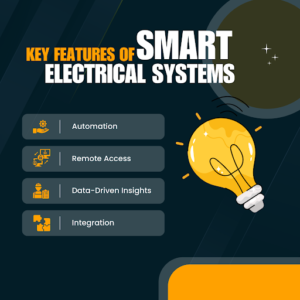BUSINESS
How Smart Electrical Solutions Transform Your Business Space?

Smart solutions are customized to specific business needs. Whether it’s running a retail store, office building, or a manufacturing facility, effective electrical installations can significantly improve how your business operates. In the current competitive market, smart electrical systems provide the necessary leverage for improving safety and operational costs. In this article, learn how smart electrical solutions change business spaces.
What Are Smart Electrical Solutions?
Smart electrical solutions use the latest technologies to automate, control, and monitor electrical systems in a business environment. Applications may include lighting systems, heating and air conditioning systems, energy management systems, security, and communication networks. Smart systems can easily be adapted to the specific needs of different business types.
For instance, West Palm Beach is becoming a dynamic hub for emerging businesses, attracting entrepreneurs and innovators across various industries. The green energy sector is gaining momentum with businesses focused on sustainability and energy efficiency taking advantage of climate and the demand for environmentally conscious solutions.
One critical component of this growth is the increasing demand for low voltage contractors near West Palm Beach. As businesses adopt smart technologies and modernize their infrastructures, low voltage contractors play a vital role in installing and maintaining systems like structured cabling, security networks, and communication systems. These contractors are essential for ensuring that businesses in industries such as tech, real estate, and hospitality can implement energy-efficient, automated solutions to meet the needs of a digital-first economy.

Key Features of Smart Electrical Systems:
- Automation: Automated systems may allow a company to automate routine work, such as switching off lights, adjusting temperatures, and regulating energy use without human interaction.
- Remote Access: With applications and cloud-based platforms, you can control your company’s electrical system from anywhere in the world.
- Data-Driven Insights: These systems provide reports on data regarding energy consumption and therefore may help identify various areas that could be potential cost savings in a business.
- Integration: Smart systems are integrated in such a manner that they allow access to one point of interface with the other technologies, security systems, fire alarms, and communications networks.
How Smart Electrical Solutions Benefit Businesses
Energy Efficiency and Cost Savings
One of the most important reasons smart electrical solutions benefit the business enterprise is energy efficiency because utilities consume quite a large portion of electricity daily. In case of inefficiency, their utility costs become high. Smart systems can automatically optimize the level of energy consumption so that no power is wasted.
For example, smart lighting controls may automatically dim the lighting depending on natural daylight availability. Another example is smart thermostats that enable fine-tuning of heating and cooling according to operational hours to avoid using utilities during off hours. Such little adjustments bring about big savings on monthly energy bills.
Another advantage that smart systems offer is the provision of energy-use insights to businesses. You can track the amount of energy different departments or machines use, which gives you data on which areas you need to cut costs or get more efficient in.
Improved Safety and Security
No business can survive without security. Smart solutions for electrical systems can therefore also mean an enhanced method of safety. Smart security systems may include any type of camera for surveillance, motion sensors, or automated door locks and alarm systems. In this context, the smart systems can be controlled remotely, which comes as a big relief to business owners even in their absence.
Another key feature is fire and hazard detection. Smart electrical systems can be integrated with fire alarms and smoke detectors to help detect hazards early enough and respond to the situation promptly. Smart sensors will alert the business owner or safety personnel of anything amiss, reducing the time taken to respond to emergencies.
For businesses handling hazardous materials or sensitive equipment, smart systems offer enhanced protection by monitoring equipment in real-time for signs of malfunction, overheating, or electrical failure.
Improved Employee Productivity
A well-designed electrical system can save energy only but might even increase productivity among employees. Smart lighting allows one to create the perfect working environment by adjusting lights with natural daylight, time of day, or personal preference. According to research, the correct lighting has been observed to reduce eye strain and fatigue, thus making it easier to achieve a steady focus and general work performance.
Smart HVAC systems can also regulate office temperatures to keep the employees comfortable and at productive capacity. Comfortable employees are likely to be effective, which in turn boosts business efficiency.
Another way that smart electrical systems facilitate productivity is through communication system integration. Smaller voltage construction companies can help make smart communication networks set up within a business to send their communication flowing efficiently, improve collaboration, and minimize system downtime.
Future-Proofing Your Business
Designed with the future in mind, smart electrical solutions advance with technology. Such systems always come in modular and scalable configurations, meaning they can grow as your business grows or when technology evolves.
For example, once renewable energies like solar panels become cheaper, businesses can easily incorporate them into their existing smart electrical networks. Smart systems are designed to control the flux of the flow from traditional power sources and renewable energy and ensure that your business uses only the cheapest and most sustainable at all times.
Smart electrical solutions save businesses the cost of building an entirely new network when they invest in such solutions today. Thus, future-proofing the operations of their business, businesses will always ensure that they remain competitive amidst this ever-changing market.
Low-voltage contractors play a major role in smart electrical solutions. For a smart electrical solution to become successful, low-voltage contractors play a vital role.
Low-voltage contractors deal with the installation and maintenance of a lower system, less than 50 volts. They install security systems, network cabling, telephone systems, and even lighting control. Low-voltage contractors ensure that these systems get fully integrated into the electrical infrastructure so that all smart technologies work and communicate effectively.
Popular Smart Electrical Solutions for Business Spaces
Smart Lighting Systems
Smart lighting is one of the most sought-after improvements for commercial settings. Such systems enable businesses to regulate lighting levels depending on changes in the light intensity from natural daylight people entering and exiting a room, or specific demands. Smart lighting systems do not only facilitate energy efficiency; they can also improve the ambiance of an environment, thereby improving the customer or employee experience.
Energy Management Systems (EMS)
Energy management systems allow companies to track the use of energy in real-time and control the energy used. It can give HVAC and lighting or other power devices optimization capabilities to cut costs and reduce the consumption of energy.
Smart HVAC Systems
Smart HVAC systems have incorporated sensors and automated controls that regulate temperature by having it changed according to the level of occupancy, current weather conditions, and other factors. These smart systems help businesses maintain comfortable environments with reduced consumption of energy and costs.
Integrated Security Systems
Intelligent security systems provide a comprehensive protection solution to organizations. Monitoring of video surveillance, access control, and motion detection can be conducted remotely. This implies that business owners enjoy real-time security updates. Indeed, the integration of these systems with other smart technologies will likely be overseen by low-voltage contractors who ensure all operations are carried out smoothly.
Automated Building Controls
An automated building control system is one where numerous electrical components, including lighting, HVAC, and security, are controlled through a single control panel. This enhances operational efficiency and allows businesses to be in complete control of the environment with as little human intervention as possible.
Conclusion
Smart electrical solutions are transforming business spaces with increased energy efficiency, improved security, enhanced staff productivity, and much more ‘future-proofing’ of operations. Ranging from smart lighting to integrated security and communications networks to intelligent HVAC, such solutions are providing the business space with many of the necessities required in today’s increasingly digitalized world.
Involvement with low-voltage contractors ensures the right execution of these systems. These experts ensure that smart technologies are integrated seamlessly into the business space, offering constant maintenance and upgrades as the technology evolves. Smart electrical solutions can be a source for saving on various operational costs of businesses, not to mention improving productivity and promoting security in the workplace.
FAQs
- What are smart electrical solutions and how do they apply to my company?
Smart electrical solutions involve advanced technologies that have the capability of automating and monitoring sophisticated electrical systems including lighting, HVAC, and security towards energy efficiency, security, and low cost-power operated activities.
Low voltage contractors have to contribute to smart electrical system installations, which could include installing all systems that require low voltage and putting a network in place for its operation.
- How do low voltage contractors contribute to smart electrical system installations?
Low voltage contractors specialize in the installation and maintenance of systems such as communication networks, security, and automated controls, all of which work on low voltage. Their expertise will thus ensure smart technologies are properly integrated to work seamlessly within your business space.
- Can smart electrical solutions reduce the energy costs?
The smart electrical system optimizes the use of energy. It controls lighting, heating, ventilation, and air conditioning, among other systems, according to real-time conditions. Thereby, this automation saves energy efficiency, thus bringing about substantial cost savings on utility bills over time.
BUSINESS
Tips for Choosing the Right Commercial Cleaning Company

Maintaining a clean and sanitary work environment is important for employee health and creating a professional image for your business. Whether you run a corporate office, a retail store, or an industrial facility, hiring the right commercial cleaning company can significantly impact the efficiency and atmosphere of your space. But with so many providers on the market, making the right choice can feel overwhelming. Not all cleaning services are created equal, and selecting the wrong one could lead to inconsistent results, poor communication, or even health code violations. To help you make an informed decision, this blog outlines six critical tips that will guide you toward choosing a reliable, reputable, and efficient commercial cleaning company that suits your specific needs.

Evaluate Industry Experience and Specialization
When selecting a commercial cleaning company, one of the most crucial factors to consider is their industry experience and specific areas of expertise. Not all cleaning services are suited for every environment/ What works for standard office space may not be effective for an industrial warehouse or healthcare facility. For example, cleaning commercial kitchens requires in-depth knowledge of food safety standards, grease removal, and sanitation protocols, making it vital to choose a provider with hands-on experience in that field. A company that understands the unique demands of your business environment is far more likely to deliver reliable, efficient, and compliant cleaning solutions that meet your expectations from the start.
Check for Certifications and Compliance Standards
Certifications and adherence to regulatory compliance are crucial indicators of a reputable cleaning company. Look for companies that possess industry certifications such as the ISSA Cleaning Industry Management Standard (CIMS) or Occupational Safety and Health Administration (OSHA) compliance. These accreditations reflect a commitment to safety, quality control, and standardized procedures. If your business requires environmentally friendly practices, verify that the cleaning provider uses green-certified products and follows eco-friendly protocols. Proper insurance coverage is a must. It protects you from liability in the event of damage or injury during the cleaning process.
Assess Customization and Service Flexibility
Every business has its own set of cleaning requirements and scheduling needs. A reliable commercial cleaning company should offer customizable services tailored to your preferences. Whether you need daily, weekly, or monthly service, or specific cleaning tasks like window washing, carpet cleaning, or post-event cleanup, the provider should be flexible enough to accommodate your routine without disrupting your business operations. Be wary of one-size-fits-all packages that don’t address your specific needs. During your initial consultation, request a detailed scope of services and ask if they are open to revisiting and adjusting the agreement as your needs evolve.
Review Reputation and Client Testimonials
Reputation is everything when it comes to service-based businesses. Take time to research each company’s reputation by reading online reviews, checking ratings on platforms like Google, Yelp, or the Better Business Bureau, and asking for client references. A company with mostly positive reviews and long-term clients is likely to deliver satisfactory service. When speaking with references, ask about the company’s reliability, communication, and attention to detail. Be cautious of companies with limited online presence or no verifiable feedback. A transparent, communicative, and dependable cleaning company will be proud to showcase its work and share testimonials.
Evaluate Staff Training and Supervision Protocols
A cleaning company is only as good as the people it employs. Inquire about the company’s hiring practices, staff training, and supervisory procedures. Do they perform background checks on employees? Are their staff trained in handling specific equipment, hazardous materials, or security protocols? Well-trained cleaners ensure effective service and reduce the risk of accidents or damage. Understand how the company supervises its teams. Is there an on-site manager or regular quality inspections? Companies that invest in continuous training and maintain high supervision standards tend to offer better and more consistent results over the long term.
Consider Communication and Responsiveness
Clear and consistent communication is a hallmark of any successful vendor-client relationship. Choose a commercial cleaning company that is responsive, professional, and easy to reach. From the first point of contact, assess how quickly they respond to inquiries, how thoroughly they answer your questions, and whether they assign a dedicated account manager. Good communication ensures that any issues or requests are handled promptly, reducing the likelihood of recurring problems or dissatisfaction. Ask about their emergency protocols. Can they handle last-minute cleaning requests or urgent sanitation needs? A company that values customer service will have a streamlined communication process and be ready to address your concerns at any time.

Finding the right commercial cleaning company involves more than just comparing prices. It requires careful evaluation of experience, certifications, service flexibility, reputation, staff training, and communication practices. By doing your due diligence and asking the right questions, you can partner with a cleaning service that enhances your business space’s cleanliness, health, and professional appearance. Investing time in the selection process now will save you from potential headaches down the road and ensure your work environment remains clean, safe, and welcoming.
BUSINESS
The Role of Genuine Auto Parts in Sustainable Vehicle Practices

Do you know how the parts in your car affect the planet?
When vehicles use genuine auto parts, they run better and last longer. These parts are made to fit the car exactly, so they don’t wear out too fast. That means fewer repairs and less waste.
Using the right parts also helps the engine work more efficiently. This can lower fuel use and cut pollution. Choosing genuine parts is not just good for your car.
Let’s explore how they help build a cleaner and greener world for everyone.
Helps Engines Run Clean
Using genuine auto parts helps your engine stay clean and run better. These parts are made to match your car’s needs, so they fit well and work the way they should. This helps the engine burn fuel properly, which means fewer harmful gases go into the air.
When engines run clean, they also stay in good shape longer. Clean engines don’t have to work as hard, which helps lower the chance of damage. This can lead to fewer trips to the repair shop.
Keeping the engine clean also helps the environment. It means less smoke, fewer pollutants, and better air quality. Using the right parts is a small choice that can lead to a big difference over time.
Reduces Frequent Replacements
Genuine auto parts last longer than cheap or fake parts. They are built to meet the car maker’s standards, so they do not break easily. This means you won’t need to replace them as often, which saves time and money.
Frequent replacements also create more waste. By using parts that last, you help lower the amount of old parts being thrown away. It also cuts down on the energy used to make new ones.
For example, many drivers shop auto parts at Roseville because they trust the quality. Getting the right part from the start helps avoid more repairs later. It’s a smart way to care for both your car and the planet.
Lowers Fuel Use
Using genuine parts helps your car use fuel more wisely. When parts fit well and work right, the engine doesn’t have to work too hard. This makes it easier to drive and cuts down on gas use.
Saving fuel is not just good for your wallet. It also means fewer trips to the gas station and less pollution in the air. Over time, small fuel savings can add up to a big impact.
Bad parts can cause problems with how your engine runs. They may lead to more fuel being burned than needed. Using real parts helps avoid that and supports greener driving every day.
Supports Recycling Systems
Many genuine auto parts can be recycled once they wear out. Makers often design them using materials that are easy to take apart and reuse. This helps reduce the need to mine or make new materials from scratch.
Recycling old car parts keeps waste out of landfills. It also helps save energy and lowers pollution from factories. By using real parts, you support this helpful cycle.
Car makers and shops often collect old parts for recycling. This is easier to do with genuine parts because they are labeled and sorted by type.
Why Smart Part Choices Matter
Choosing the right parts for your car helps both you and the world around you. When your car runs well, it uses less fuel and creates less waste. Small changes can lead to better habits and a cleaner future for everyone.
For more helpful blog posts like this one, visit the rest of our site!
BUSINESS
The Importance of Inventory Control in Warehouse Management

Inventory control is the backbone of successful warehouse management. It refers to the processes and strategies used to monitor, regulate, and manage stock levels, ensuring the right amount of inventory is available at the right time. Without proper inventory control, warehouses are prone to overstocking, understocking, and inaccurate data. As the global marketplace becomes increasingly fast-paced and competitive, having robust inventory control systems has become not just a logistical necessity but a strategic advantage. In this blog post, we’ll explore the various ways inventory control contributes to effective warehouse management, highlighting the critical role it plays in streamlining operations, boosting productivity, and maximizing profitability.

Minimizing Overstock and Stockouts
Balancing inventory levels is vital to avoid the costly problems of overstock and stockout. Overstock ties up valuable capital and warehouse space, leading to increased storage costs and potential product spoilage. Stockouts result in missed sales opportunities and unhappy customers. Effective inventory control relies on accurate tracking and demand forecasting to maintain this balance. Companies like tigermaterialhandling.com often emphasize the importance of real-time inventory data and smart replenishment strategies to help warehouses adjust stock levels proactively. By minimizing these extremes, businesses can optimize cash flow, improve customer satisfaction, and operate more efficiently without unnecessary inventory risks.
Enhancing Order Accuracy and Fulfillment Speed
Inventory control directly affects how quickly and accurately customer orders are processed. When inventory levels are well-managed and properly recorded, picking and packing processes become more efficient. Warehouse staff can locate items faster, leading to quicker turnaround times and fewer errors in order fulfillment. This efficiency is critical in maintaining customer satisfaction and loyalty, particularly in an era where next-day or even same-day shipping is often expected. Barcode scanning, RFID tags, and warehouse management systems (WMS) help automate these processes, reducing manual mistakes and boosting order accuracy. Effective inventory control shortens lead times and enhances service quality.
Improving Warehouse Space Utilization
Warehouses have limited space, and how that space is used can significantly impact operational efficiency. Without proper inventory control, products may be stored haphazardly, leading to congestion, misplaced stock, and increased handling times. Efficient inventory control enables better organization by categorizing products based on demand frequency, size, or storage requirements. This structured approach facilitates easy access to high-turnover items and optimal use of shelf space. Advanced systems can even recommend ideal slotting configurations, minimizing travel time within the warehouse. By streamlining storage practices, businesses can maximize existing space, delay or avoid expansion costs, and support smoother day-to-day operations.
Enabling Accurate Forecasting and Planning
Inventory control provides valuable data that feeds into demand forecasting and business planning efforts. When warehouse managers have a clear picture of inventory trends, such as seasonal demand patterns or slow-moving items, they can make informed decisions about procurement, staffing, and budget allocation. This data-driven approach minimizes the risk of reactive decision-making and supports long-term planning. For example, knowing when certain products typically experience peak demand can help in preparing stock levels and labor schedules in advance. Inventory control thus acts as a foundation for strategic planning, ensuring that warehouse operations align closely with broader business objectives.
Reducing Operational Costs and Waste
Uncontrolled inventory often leads to unnecessary expenses, such as storage costs, spoilage, and obsolescence. With efficient inventory control, these risks are greatly reduced. Businesses can track product expiration dates, rotate stock using FIFO (first-in, first-out) methods, and avoid the accumulation of redundant or obsolete items. Better forecasting and order planning mean fewer emergency purchases or expedited shipments, which are typically more expensive. Streamlining inventory reduces the labor required for inventory handling and audits. These efficiencies translate into significant cost savings, improving the financial health of the warehouse and the business as a whole.
Enhancing Visibility and Accountability
Visibility into inventory levels and movements is crucial for managing a transparent and accountable warehouse. Inventory control systems provide real-time tracking of products as they enter, move through, and exit the warehouse. This level of visibility reduces the likelihood of theft, loss, and administrative errors. It makes audits and compliance reporting more efficient and accurate. Clear documentation and digital records help hold employees accountable for stock management and make it easier to identify and resolve discrepancies. By fostering a culture of accountability, inventory control improves internal processes and external trust with stakeholders and customers.

Inventory control is far more than a logistical task. It is a strategic pillar that supports the efficiency, reliability, and profitability of warehouse operations. From minimizing costs to enhancing customer satisfaction, its impact is broad and critical. As warehouses continue to evolve with technology and shifting market demands, prioritizing strong inventory control practices will be key to staying competitive and achieving long-term success.

 Cartoon1 year ago
Cartoon1 year agoUnlocking the Potential of Nekopoi.care: A Comprehensive Guide

 Game1 year ago
Game1 year agoExploring Aopickleballthietke.com: Your Ultimate Pickleball Destination

 BUSINESS1 year ago
BUSINESS1 year agoWhat Companies Are In The Consumer Services Field

 BUSINESS1 year ago
BUSINESS1 year agoUnraveling the Mystery of 405 Howard Street San Francisco charge on Credit Card

 HOME IMPROVEMENT1 year ago
HOME IMPROVEMENT1 year agoVtrahe vs. Other Platforms: Which One Reigns Supreme?

 TECHNOLOGY1 year ago
TECHNOLOGY1 year agoThe Guide to Using Anon Vault for Secure Data Storage

 ENTERTAINMENT11 months ago
ENTERTAINMENT11 months agoUnderstanding Bunkr Album: A Comprehensive Guide

 ENTERTAINMENT1 year ago
ENTERTAINMENT1 year agoThe Epic Return: Revenge of the Iron-Blooded Sword Hound
















